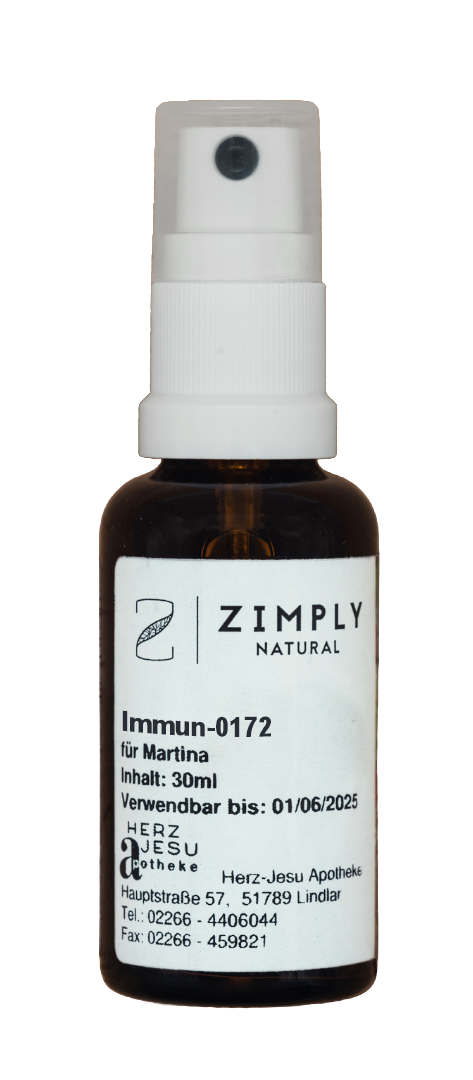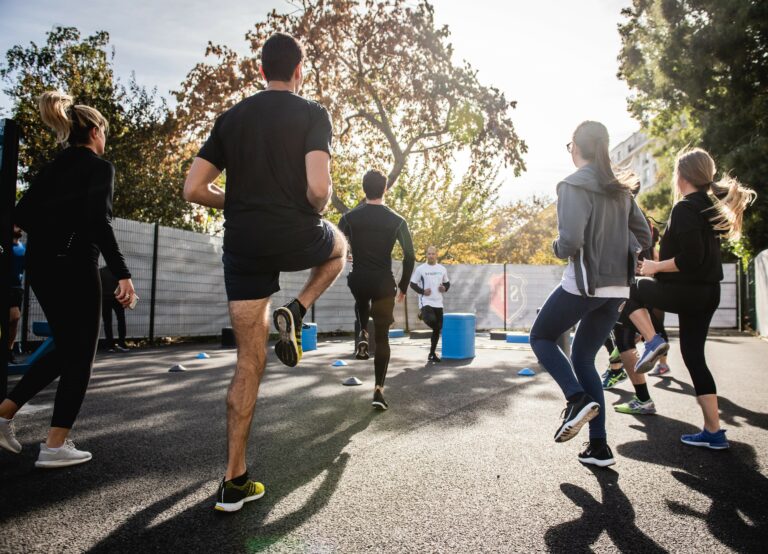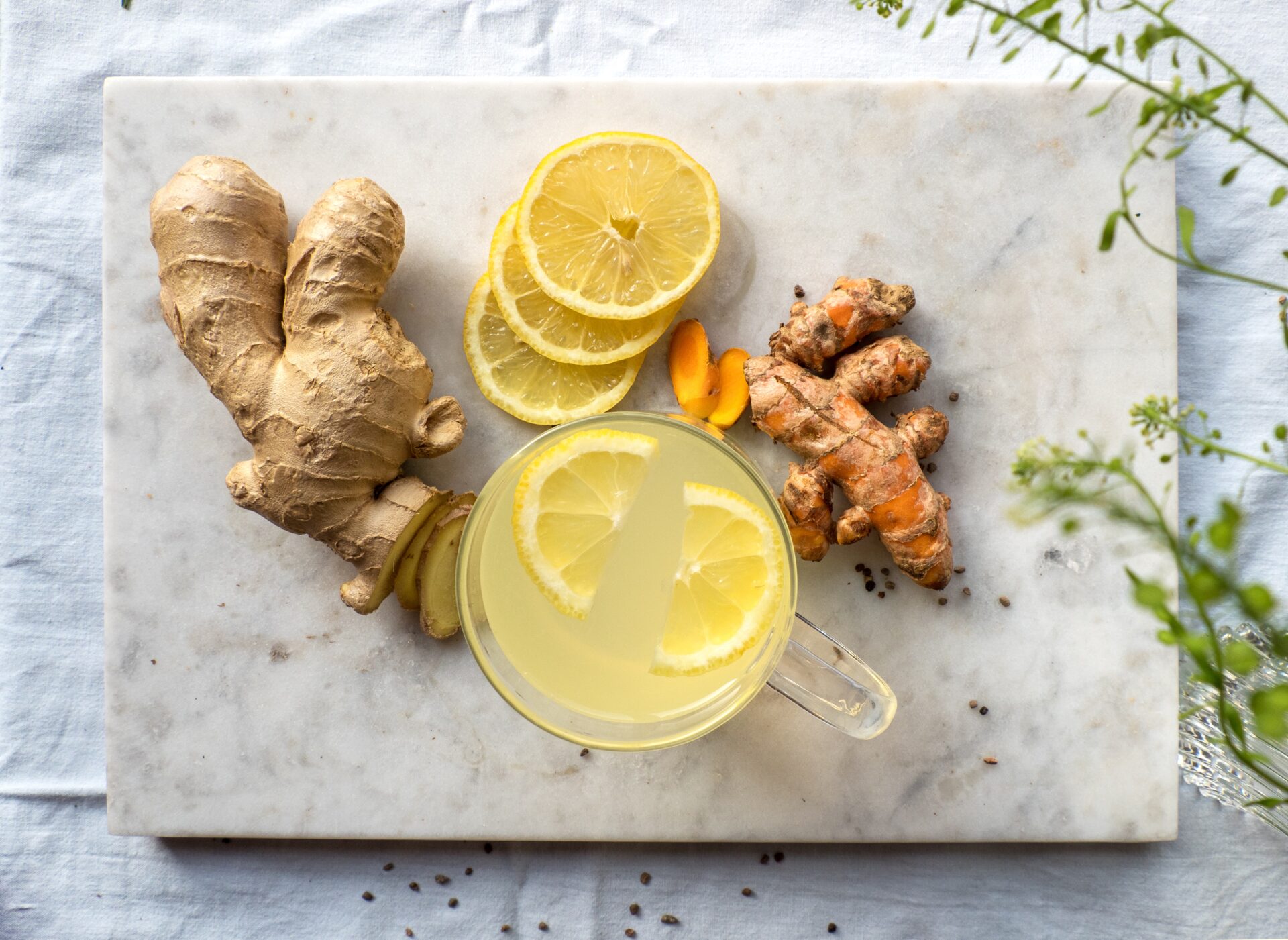Now it's that time again: With the onset of autumn and the increasingly cool and rainy weather, the activity of numerous cold viruses is on the rise again. Who to a weak immune system and does not want to catch an infection, should now take measures to actively strengthen its body's defenses. But how can you support your immune system in the long term? We reveal the most common causes of a weak immune system and give you 7 simple tips to strengthen your body's defenses.

Your individual immune blend
With natural methods such as the individual spagyric sprays from Zimply Natural, complaints can be treated and sustainably alleviated.
What is the immune system?
The immune system, our body's own defense system, is responsible for protecting our body from pathogens, pathological cell changes, such as cancer, and environmental toxins. Its main function is to fight invading pathogens, such as bacteria, viruses and fungi, by weakening them through certain defense cells and transporting them out of the body. It is also able to locate damaged and defective body cells and transport them out of the body, as well as assist the organism in wound healing.
The specific and non-specific body defenses
Our immune system is composed of the specific and non-specific defenses, which are closely linked. While the non-specific defense exists from birth, the specific defense is formed only in the course of life.
The non-specific, innate body defense reacts more quickly to pathogens that attack the body, but usually not effectively enough. It has difficulty differentiating between the various foreign bodies and is usually unable to adequately protect the body from them. Its protection is provided by external barriers of the body, such as the skin, mucous membranes, eye fluid, saliva and stomach acid, certain signaling substances and certain white blood cells. White blood cells include phagocytes, which detect and eliminate invaders by eating them.
As soon as the non-specific defense fails, the specific body defense kicks in, consisting of B and T lymphocytes. This can differentiate between the various pathogens and fight them specifically. It kicks in as soon as the non-specific defense fails. Initially, it then takes longer to act against an unknown foreign body, but it is capable of learning and can thus put it out of action more efficiently when it comes into contact again.
Symptoms of a weak immune system
- Fatigue, fatigue and difficulty concentrating
- Higher susceptibility to chronic diseases and infections
Possible causes of a weak immune system
1. stress
At Anti-Stress for example, blood pressure and muscle tension increase, the heart starts racing, breathing accelerates and digestion is neglected. A stress reaction of the body occurs when we believe we cannot accomplish a task. In these situations, this reaction is meant to empower our mind and body to meet the challenge and can be quite positive in making us more efficient in the short term. However, prolonged stress puts us at risk for a number of diseases. When cortisol levels persistently increase due to chronic stress, the number of immune cells, the production of antiviral messengers and the activity of natural killer cells in the blood decrease.
2. poor nutrition and intestinal health
Often, a weakened immune system is due to malnutrition and an accompanying protein deficiency, which, in addition to compromising the immune system, can weaken the body through diarrhea and intestinal inflammation.
Gastrointestinal health is also central to our immune system, as around 70% of our immune cells (lymphocytes) are located in the intestinal mucosa, the so-called gut-associated lymphoid tissue (GALT). It is responsible for the defense against unwanted pathogens and foreign substances. If the immune system is impaired, this can also be caused by a disturbed intestinal flora.
3. insufficient sleep
Since the immune system requires a lot of energy to function, a restful sleep and recovery period is important for immune health. According to current studies, sleep increases in the Sleep the number of natural defense cells increases, which is important for effectively fighting viruses and bacteria. Therefore, chronic sleep deprivation often results in an increased risk of infection and has an even more negative impact on the immune system than stress, for example.
7 simple tips to strengthen the immune system
1. spicy food

Spicy food not only strengthens the immune system, it also helps existing colds to subside more quickly. The spiciness increases the blood flow to the mucous membranes, so that nasal congestion can be relieved more easily.
It is best to use typical spicy ingredients such as chilies, ginger and horseradish as well as spices such as pepper, harissa and curry.
2. nutrition for a healthy intestine

About 70 percent of immune cells are located in the small and large intestine. Therefore, a healthy immune system goes hand in hand with a healthy gut. To protect yourself from many different diseases, you can strengthen your intestinal health naturally with a diet rich in probiotic and prebiotic foods. The most important probiotic foods are sour milk products such as yogurt, kefir and ayran, soured milk and lassi. Prebiotics include leeks, onions, garlic, wheat, rye and bananas.
To protect against colds, care should also be taken to drink enough water. Plenty of fluid supports the natural barrier function of the mucous membranes by keeping them moist.
3. soak up the sun

In addition, it can be helpful to sunbathe. Sunlight is relevant for hormone production and has some beneficial effects on the immune system. This is because it is needed for the creation of three basic substances in our body - vitamin D, serotonin and melatonin.
The majority of the vitamin D requirement is formed via the UVB rays of sunlight. Vitamin D stimulates the so-called killer cells to fight off certain pathogens. If the body is undersupplied with the vitamin, the killer cells remain inactive. As a result, the immune system is less powerful.
Scientific evidence also suggests that there is a link between vitamin D levels and the risk of acute respiratory illness.
For good vitamin D synthesis, you should spend about ten to 15 minutes in the sun three times a week, keeping your face, hands and forearms exposed.
4. regular exercise in the fresh air

According to scientific studies, daily exercise, at best in the fresh air and sunshine, boosts the production of influential immune cells and messenger substances in the body.
Endurance sports such as running, cycling or swimming support the body's defenses particularly well.
However, care should be taken not to do too much sport. Too much sport weakens the immune system rather than strengthening it.
5. good sleep

It is assumed that restful sleep increases the number of natural immune cells and thus supports the successful defense against pathogens. However, how exactly sleep influences certain immune functions has not yet been researched scientifically enough.
Scientists at the University of Tübingen and the University of Lübeck have, at least in a 2019 study, explored a mechanism by which sleep strengthens the immune system.
The subjects' results showed that just three hours of sleep deprivation disrupted the function of so-called T cells. T cells are white blood cells that fight pathogens.
5. vitamins

Vitamins and trace elements, such as vitamin C, zinc, selenium, copper, folic acid, vitamin A, vitamin B2 and vitamin B12, support normal functioning of the immune system.
However, vitamin D is particularly important for the immune system. The body can produce the sun vitamin itself via UV radiation. However, according to a study by the German Nutrition Society (DGE), around one in three people in Germany has a vitamin D deficiency. Accordingly, you should pay attention to a good vitamin intake.
7. sauna and alternating showers

Regular sauna sessions can not only be insanely relaxing, but also strengthen the immune system.
This is due to the fact that in the sauna the body temperature increases in a short time - the skin by an estimated ten, the body interior by about two degrees. The heat strengthens the body's own temperature regulation.
As a result, the organism learns to better maintain body heat in cold outdoor temperatures.
In this way, sauna sessions help prevent flu-like infections, as these are often due to hypothermia.





